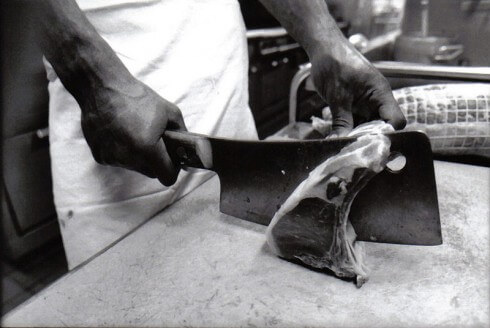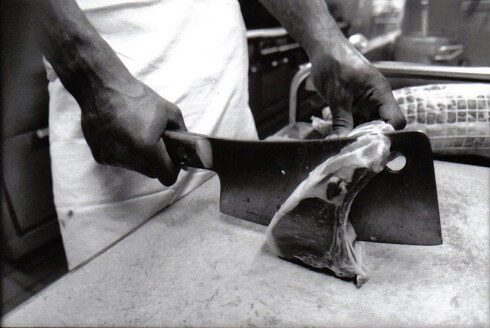 Author’s note: Hello and welcome. Here you will find links to my published works. And from time to time, I may even blog—because, really, there aren’t nearly enough blogs out there, especially when it comes to food and drink. —VLM
Author’s note: Hello and welcome. Here you will find links to my published works. And from time to time, I may even blog—because, really, there aren’t nearly enough blogs out there, especially when it comes to food and drink. —VLM
The recent dustup between Anthony Bourdain and Paula Deen (as noted in TV Guide, the New York Post, and the New York Times) reminded me of a phone interview I did with Bourdain back when I was writing about celebrity chefs. He had a lot to say, all of it on the record, most of it never used. Even if you find him a bit much, it’s still entertaining. Over the next few weeks I will be publishing segments of that interview here on this site. Just keep the context in mind—this all took place in 2007, back when we could afford to be obsessed with such frivolities as the Food Network and cooking shows.
Okay, so we’re still obsessed. And while some of what he says no longer applies, other comments are more relevant than ever. He doesn’t like Rachael Ray, he really doesn’t like Sandra Lee (though as he pointed out in TV Guide, he is actually terrified of her), but he does like Ina Garten. Enjoy.
From a phone call on June 12, 2007
VM: A few months ago you posted an item on Michael Ruhlman’s blog in which you laid out a full critique of the Food Network and its stars. What finally brought you to that point?
AB: I think, you know, an intermittent sense of nausea and outrage that wells up in me now. You know, it’s the same—I guess I should point out that when we’re talking about celebrity chefs, there are two distinct schools of characters who you could credibly refer to as celebrity chefs. There are people who are or were inarguably professional chefs, who at one point in their career or who are currently operating or operated empires of restaurants and came up through professional situations, you know, Emeril, Mario, Bobby Flay, Jacques Pépin, guys like that. And I have no argument with really any of them in principle. We will now and again, if I see one doing something that I find just morally egregious or nauseating or who I feel has sort of betrayed, you know, the Cosa Nostra of chefs. But by and large, of the guys who are on TV, [although] I don’t like Emeril’s show, he deserves a lot more respect than I’ve given him in print. He’s a titan compared with the other school.
The best examples to compare and contrast would be Rachael Ray and Ina Garten. Now Rachael Ray very cleverly says again and again I am not a chef. But she is of course for all intents and purposes in the world we live in now thought of as a celebrity chef. She’s part of the Food Network. I skew my criticism of her, which is pretty ferocious—well, I judge her by a different standard. I’m not comparing either what she does or what she should be doing to what Jacques Pépin does. That would be unfair criticism to compare her with someone who has spent a lifetime in the restaurant business. There are working families with kids who need that kind of show, who benefit from what a show like that can do. I just think she suffers very, very badly by comparison to Julia Child, who was not a professional chef either. And perhaps more explicitly, she suffers more in comparison with someone like Ina Garten. Ina Garten makes decent, good, quick to prepare unthreatening food that any home cook could make. I don’t think that what Rachael Ray is selling is really food or cooking. I think that she is closer to Paris Hilton than to Julia Child as someone who is famous for just being there and who is sending a kind of reassuring message that, “Gee, someone as dumb as me is on TV and that my life is quite good enough.” I think cooking shows should be aspirational and she inspires nothing but laziness, sloth, and a smug assurance that everything’s okay.
Again, my criticism is not so much that her food suffers by comparison to restaurant food. It’s that she cheats. She tells people you don’t even have to dice an onion. A pre-chopped onion bought in a supermarket first of all tastes terrible. It’s a completely different flavor. To ignore that is to lie. It’s also more expensive. So to claim you are helping working families by suggesting such a thing is shameful. And I find frankly when you are as powerful and as influential as she is, particularly with kids, to serve food that is clearly unhealthy and to endorse a product like Dunkin’ Donuts. I mean, How much money do you need? To use your terrible powers of celebrity for that rather than what, for instance, Mario Batali has done. I just think she compares badly to just about everyone on the playing field. And Sandra Lee—that is just pure evil. I put her right up there with Ted Bundy. That’s just disgusting and conceivably in a few years illegal. I mean if the current trend against transfats and political correctness continues, something I hope doesn’t, I can clearly see a situation where she is seen as a clear and present danger.
VM: If you go to the bookstore today, there are more than 30 celebrity chefs featured on three shelves. This was not always the case, say, 10 or 15 years ago. What happened?
AB: Well, I think Emeril was truly a groundbreaking figure who really kind of almost singlehandedly created the chef as a media multiplatform superstar. But why did that happen? Why did eating at restaurants become a viable form of entertainment? In the old days, you ate at home and talk about the movies you saw, the books you just read. Maybe you went to the theater. Now you eat at home and you talk about the restaurants you ate in. And where you’re eating. A lot of chefs who go back a ways remember well the days when it was a low prestige profession with little hope of ever raising yourself up. We wonder about that a lot and speculate about it and I’ve heard two different theories.
One is that after AIDS and this awareness of sexually transmitted diseases, that sexual behavior became a lot more restrained. There wasn’t that sort of libertinism of the ’70s and that it is through sexual repression that people are filling some emptiness in their [lives]—they’re transferring a desire for messy and unsafe sex to the kitchen.
The other theory is that chefs are a less threatening kind of cuddly alternative to sort of the boy band or the rock ‘n’ roll stars or the movie stars. You know, they’re less likely to do terrible things to you if you were to have them in your house. But you know, I think they’d be wrong in thinking that but just the same, as I think I said elsewhere, Emeril is less likely to pilfer through your medicine cabinet and give you an STD in most people’s minds than, like, Keith Richards.
And the other theory I heard I think that is really interesting is that there’s a general sense of displacement. That a lot of people leave home now at 17, 18, they go off to college—you’re born in the midwest, you leave home, and you go to a big city. And you live alone in an apartment or with a couple other friends, and there’s a kind of collective yearning for a sitting around the table, having this sort of nuclear family that cooks, that really never existed in most of our lifetimes. We started off with TV dinners with our families and then left our families and moved to the big city and the closest we get to that is kind of like this Sex in the City–Friends scenario where we huddle around coffee or go out to places for entertainment. So maybe these are surrogate parents and brothers and sisters who are cooking for us on TV and are fulfilling for us some kind of collective yearning in that area.
In any case I think a lot of it is pure porn in that I don’t know that people are actually watching Rachael or Emeril and even trying to cook that stuff.
More from the Bourdain archives next week.

Love this site. It should be a first stop for everyone interested in food, drink, politics, and life in general.
Love this! I will re-post and write about it on my blog as well 🙂 The Olive Garden article is worth it alone – LOL! Hope all is well!
Came over here from The Weekly Standard. Bourdain is fascinating and entertaining to watch (and yes, I actually find myself wanting to try to cook some of the stuff that he has had on his shows).
I think he’s an interesting guy with an unconventional but nonetheless analytic take on things. And perhaps that’s why most of his responses in this part of the transcript are so much sound and fury (don’t get me wrong, I like sound and fury). The last part gets to the meat in this messy sandwich: “In any case I think a lot of it is pure porn in that I don’t know that people are actually watching Rachael or Emeril and even trying to cook that stuff.”
There it is. It’s food porn. We like food. We have successfully transformed food into another form of televised/digitized entertainment. As a side effect, it might get people more interested in the quality of their food or the joy and simple benefits of cooking for themselves. But it’s mostly just food porn in my opinion.
Food porn is very fun!
Vic – Still one of your biggest fans though we haven’t seen each other in awhile. Hope all is well! – Kathy
What a delight to read! You inspire and make people laugh….especially the Queen aka Cousin Cutlet.